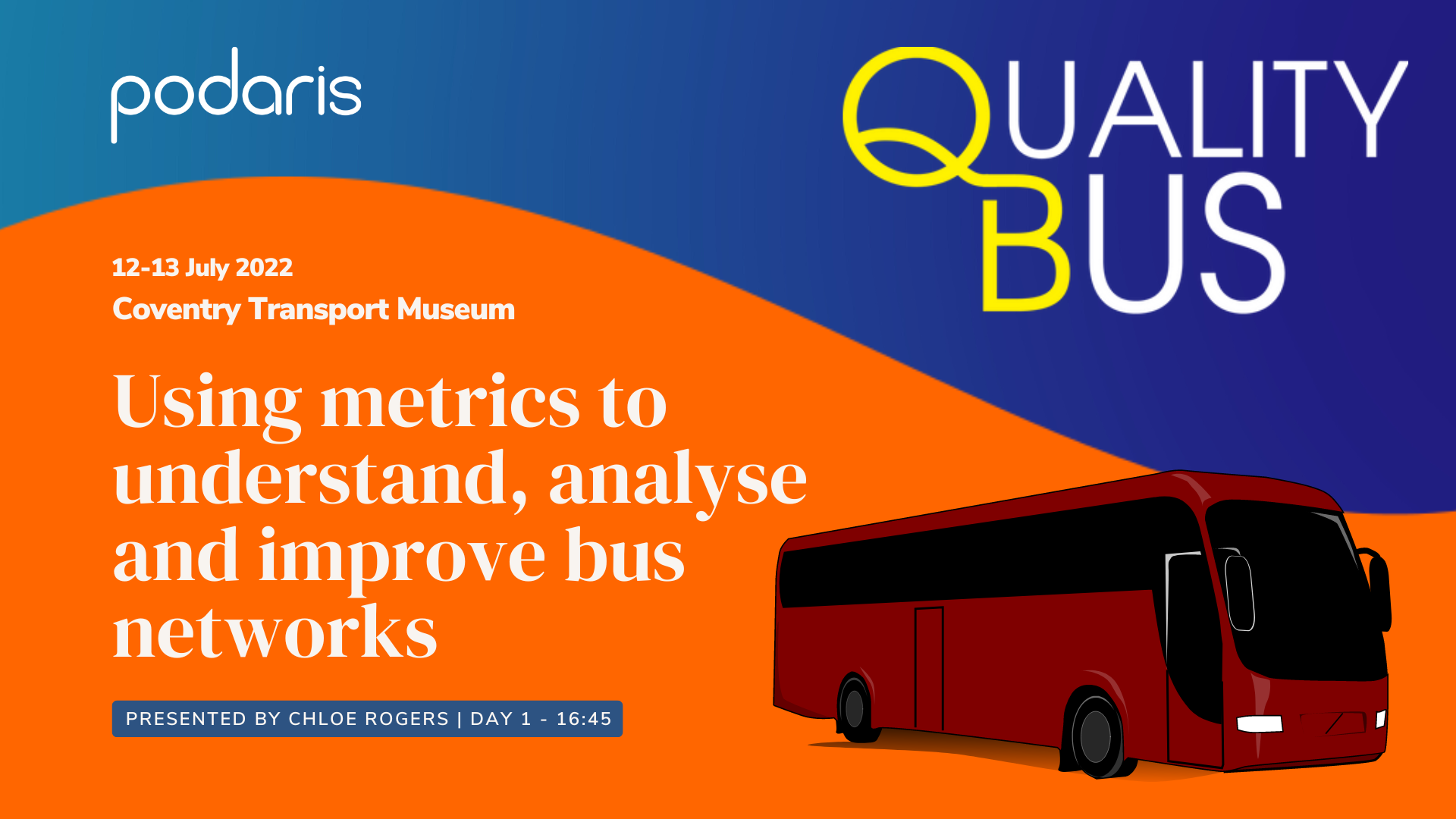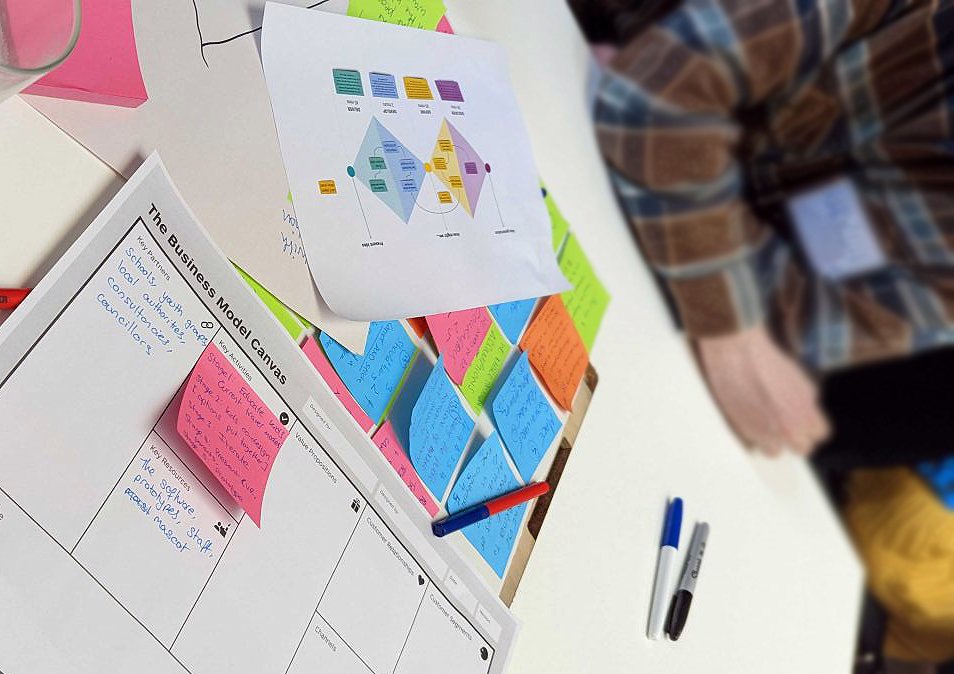
The last few months have seen the welcome return of numerous transport events up and down the UK, as falling COVID numbers have encouraged transport professionals to leave their desks to meet, network and share their knowledge and experiences in person. We've attended several throughout the summer and autumn, so we thought we'd recap a few here.
Over the last couple of years at Podaris, there's been much focus on buses, as we've supported local authorities in the UK to produce Bus Service Improvement Plans and Bus Network Reviews faster and more efficiently. We were therefore excited to attend this year's Quality Bus Event between the 12th and 13th of July at the Transport Museum in Coventry, an event focused on those who are responsible for designing, planning, supplying and operating quality bus routes and networks.
Topics this year included reducing operator costs, decarbonisation of vehicles, funding frameworks and business models, rural/peri-urban services and DRT, understanding bus usage and networks, improving the passenger experience, bus priority schemes, bus and passenger infrastructure and partnership working.
The opening presentation was from Mark Collins, Integration innovation Lead at TfWM who spoke about the West Midlands Future Transport Zone (FTZ) and the key role of buses. He talked about the targets they have for 2041, which include a 36% reduction in car travel and a 100% increase in travel by public transport. Their regional challenge is to sustain economic success, create a fairer society, support local communities to become more active and meet the climate challenge. The FTZ seeks to understand the local population, develop new transport services to further modal shift and transport decarbonisation. They are also looking to introduce a Coventry centric DRT trial service.
Richard Walker from the Local Transport Directorate at the DfT spoke of the need to bring bus use back to pre-pandemic levels, with a focus on increasing patronage and raising bus mode share. This included integrated ticketing, more DRT, lower fares, simpler services, more Bus Rapid Transit and networks that feel like a whole system. He also mentioned that Enhanced Partnerships/Franchising are a statutory requirement and that all Local Authorities will need to update their BSIPs annually and reflect these in the Local Authority’s Transport Plan. Richard also mentioned the Rural Mobility Fund Pilots which included provision of rural buses in places like Leicestershire, Staffordshire and Gloucestershire.
The DfT will provide ongoing assistance to Local Transport Authorities (LTAs) to deliver their BSIPs and support all those who were unsuccessful in securing BSIP funding with a capacity grant to fund in-house capability to deliver their Enhanced Partnerships.
Chloe Rogers, Transport Planner at Podaris gave a presentation on using metrics to understand, analyse & improve bus networks. This included looking at metrics such as patronage, accessibility, route pattern, and frequency to create an equitable bus service network. Chloe cited the example of Slough Borough Council which did not receive any funding for their proposed BSIP. Residents here live within 400 metres of a bus stop and Slough has a higher percentage of zero car households than the neighbouring Berkshire local authorities. Chloe demonstrated how by using our early stage transport planning tool, planners are able to plan and analyse bus services more quickly and accurately than by existing manual processes.
Trapeze also presented during the conference and dove into the capabilities of their operational/scheduling software.
Pete Bond, Director of Integrated Services at TfWM outlined the role and contribution of TfWM in increasing bus patronage and developing a Local Transport Plan and developing Network Reviews for the seven authorities across the region. This included integrating the Commonwealth Games in a 16 days time period, Sprint Bus Rapid Trust, major metro extensions across the Black Country, Birmingham, DRT pilots and Rail Investment Programmes. The role of bus was paramount in constituting a recovery in public transport patronage and in meeting climate targets. He ended his presentation by highlighting the need to integrate the different modes of transport.
The second day of the event had a strong focus on rural and peri-urban DRT services with a presentation by David Pipe from Coventry City Council on the potential use of DRT services to support urban extensions.
RTIG Improving Bus Services Using Data - Sept 21, 2022
Later in the year, the RTIG Improving Bus Services Using Data in Birmingham hosted a series of discussions around the operational side of bus services, with a focus on software and web platforms that help improve journey times and performance
Ito world were in attendance, discussing the development and use of Analyse Bus Open Data (ABOD), an extension service to the Bus Open Data Service (BODS), that provides free-to-access reporting and analytics to operators and authorities nationally. Swiftly Inc. spoke about improving timetable accuracy by analysing route segments that were faster or slower than the timetabled speeds and Go-Ahead gave an operator perspective at the event, while Prospective Labs demoed how their product can be used to improve service punctuality.
Elsewhere at the conference, Darren Thrump from the Regional Transport Coordination Centre (TfWM) talked about the benefits of the centre and the main dashboard, which allows them to view reported diversions and delays, quickly find out more information and inform drivers, if necessary. The system is also currently in use planning changes to routes ahead of major events or roadworks.
A panel session brought together John Wicks (Stagecoach), Graham Pether (GoAhead) and Simon Gold (Reading Buses) to discuss the need for OD data and the potential benefits of tap-on tap-off systems. Elsewhere, Alchera spoke about how they're using data to prioritise improvements to priority at signals by collecting data on variability of route speed at junctions and providing recommendations based on this and other factors.
Finally, MiX Telematics talked about their onboard systems which help measure a variety of factors including fuel efficiency.
Mobility Camp - 29th Sept. 2022

The 5th Mobility Camp (previously Transport Planning Camp) volunteer run ‘unconference’ in Bristol, also in September brought together transport planners, modellers, engineers, technologists, social activists, academics to discuss this year's theme, ‘Backing Sustainable Transport’. At the unconference, each attendee was invited to note down possible topics for discussion, which were collectively scored, resulting in rural mobility being the highest scoring topic and public participation and engagement also scoring highly.
Attendees could them choose three ‘streams’, stream 1: influence - how we influence people, stream 2: offload - sharing experience, and stream 3: design - getting practical and doing something about it. Our resident transport planner Chloe Rogers, attended this third stream, joining a group to tackle public education and participation, and the lack of engagement from the public.
It was suggested that public consultations can struggle to target a wide range of backgrounds and tend to receive a high proportion of responses from older populations. Furthermore, younger populations tend not to respond as much to typical modes of consultation but are affected by changes for a longer time.
The group's idea was to involve local schools in the design process to help with education, making kids aware of the career, cover a more representative view of the local population (as school choice tends to be based on location rather than other factors, particularly primary school) with the aim that this would then feed up to other family members. The five stage proposal by this group was to:
- Educate children about the different options and their benefits and drawbacks
- Allow the children to come up with their own ideas
- Use VR to let them see the different ideas - stage 2 and 3 possibly iterated to refine the ideas
- Hold a presentation evening where the kids can share their ideas with parents and the local community, and additional ideas and feedback can be gathered from attendees
- Create a physical prototype to allow people to get a better idea of the solution and give final feedback
Comprehensive round-ups of the events, including the live illustrations created during the unconference, are available at https://mobilitycamp.co.uk/
We're looking forward to a number of future events in the last quarter of this year, so be sure to follow us on LinkedIn or Twitter to keep up to date.
For a guided tour of all that Podaris has to offer, head over to our website and schedule a demo with us today!